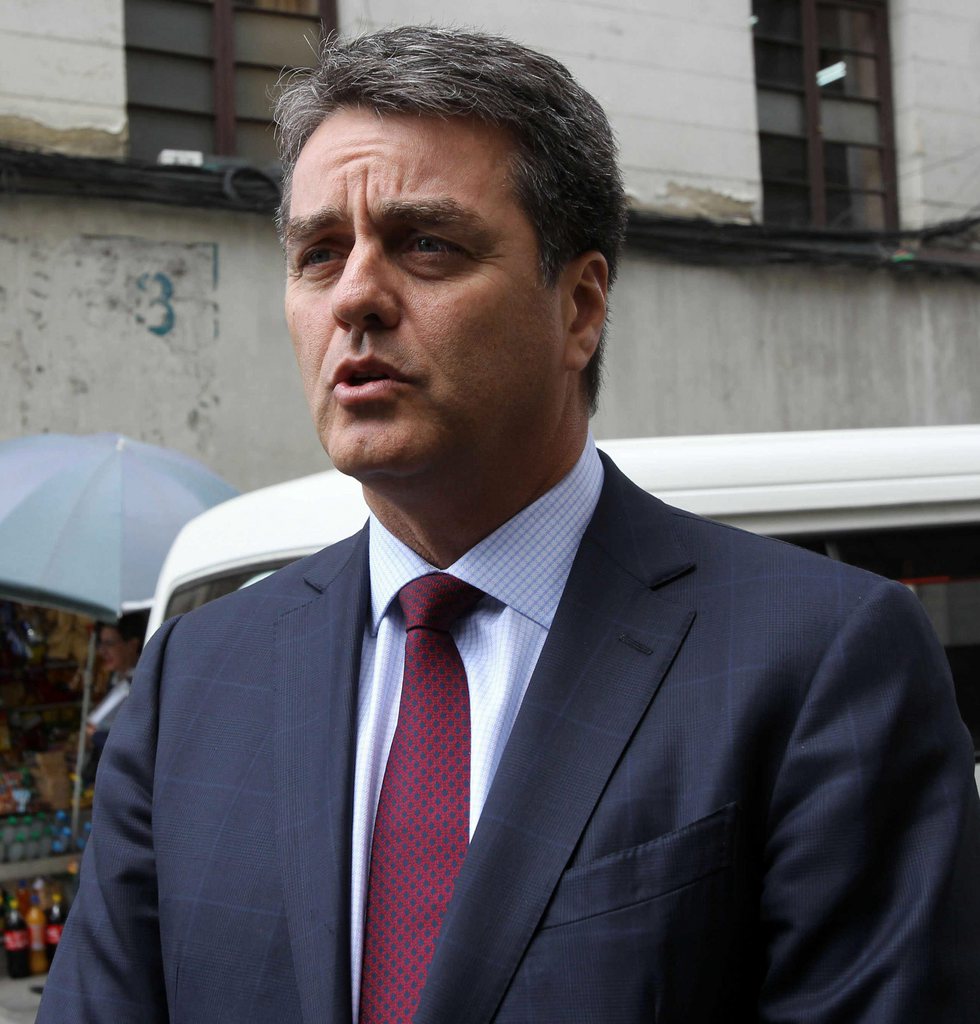
New WTO leader faces rough road ahead

Brazil’s Roberto Azavedo, announced as the new Director-General of the World Trade Organization on Wednesday, is a savvy “dealmaker” but will face a host of challenges in his new position, says former Swiss WTO negotiator Luzius Wasescha.
Azevedo, who will be the first Latin American to hold the position and the first to hail from one of the so-called BRICS group of emerging economies, beat Mexico’s Herminio Blanco for the job in the final round. Now observers are left to wonder if he will be able to revive multilateral negotiations after the failure of the Doha round of talks when he takes office in September.
swissinfo.ch: What do you see as first on the agenda for Azevedo in his new role, especially in the context of the deadlocked Doha trade talks?
Luzius Wasescha: The negotiations of the WTO can be inspired by the director-general, but the decisions have to be taken by members. The change of director-general won’t immediately change the situation. Maybe Azevedo is more convincing in certain capitals than (his predecessor) Pascal Lamy was, but he of course has a very broad perspective of the needs of emerging countries.
This will be his biggest challenge: to do his job objectively and convince those emerging markets and industrialised countries to be more flexible on certain issues.
As soon as you look into the technicalities, it’s no longer a North-South issue, but a trans-Atlantic issue. The EU has their system for standards, the US has theirs, and it’s almost impossible to bridge unless the two sides show flexibility.
swissinfo.ch: Do you think Azevedo is the right man to take on this difficult task? What unique assets does he bring to the position, and what particular challenges do you see cropping up for him?
L.W.: I think he is the right man not because of his origin but because of his personality. I experienced two situations with him where he really proved himself as a dealmaker. When we prepared the last ministerial meeting with the very pessimistic language from Doha, Azevedo was the architect of the language. And at last year’s ministerial meeting in Doha, at 3 a.m., he stepped in representing the developing world and I was the spokesperson for the non-EU industrialised countries, and we very rapidly came to a deal. So he has really proven that he is able to do that, and I am sure he will do the same as the head of the WTO secretariat.
swissinfo.ch: Some say the WTO is at risk of becoming “irrelevant”. Do you agree with that assessment and what do you think can be done to reverse that trend? Will Azevedo’s appointment provide enough of a sea change for the organisation?
L.W.: The risk certainly exists but there are many ingredients in place which can prevent that, and I am sure Azevedo will do what he can. Personally I would say the most important thing is to get rid of the theological debates, all the general discussions about development. They don’t bring results because in the negotiation you always have at least two tendencies among developing countries: those who are competitive are in favor of a liberal solution, those who are not competitive are not. So the criteria is not whether a country is developing or not developing, but whether or not it is competitive.
We have created in these negotiations new groups of small, vulnerable economies where the situation is totally different from the situation in Brazil, India and China. You have countries that immediately lose their export markets if the competitive exporters get better market access. And you need to find a solution to the question: what should these small producers be doing in the future? They produce coffee, bananas, cotton, all things the Brazilians are producing themselves, all in a more competitive way than the Caribbean states, for example.
Azevedo will have to be advised by people from all sensitivities in the WTO and I hope that he will not confine himself to a system where only the major players are represented. Because in a negotiation, you need a certain number of people around the table who can make proposals to fill the gaps. If you only have the major players, the only one who can make proposals to bridge the gap is the director-general. But once he has played his cards without success, you are blocked – that’s what happened with the Doha round of talks.
swissinfo.ch: What would be the consequences for Switzerland if the WTO’s influence and trade talks can’t be revived under Azevedo’s leadership?
L.W.: The Swiss economy is very well adapted to these new trade schemes, how it takes place, with the supply chains and the cooperation between small and medium-sized enterprises and big players. Here, Switzerland certainly has good cards.
Politically, Switzerland has less favourable cards because whatever we decide in Switzerland, we cannot forget that we are in Europe, and outside of Europe we are perceived as a European country. Generally, in the first half hour of contact with a partner from outside Europe, we have to explain that we are not in the EU and why we aren’t. It’s sort of a double marginalisation – we are marginalised in Europe because we are not a member of the EU, and Europe itself is marginalised in this new, emerging world where the centre is more in the Asian or Asia-Pacific regions.
Switzerland should be more proactive. What I notice now is that my successors are very prudent, but with prudence, we cannot survive.

In compliance with the JTI standards
More: SWI swissinfo.ch certified by the Journalism Trust Initiative































You can find an overview of ongoing debates with our journalists here . Please join us!
If you want to start a conversation about a topic raised in this article or want to report factual errors, email us at english@swissinfo.ch.